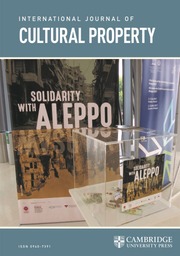Article contents
Decoding Implications of the Genographic Project for Archaeology and Cultural Heritage
Published online by Cambridge University Press: 30 July 2009
Abstract
Recent controversies surrounding the Genographic Project, sponsored by the National Geographic Society and IBM, and its predecessors call attention to a need to better understand the broader ethical and practical implications of uses of ancient and contemporary human genetic information, which is today a form of cultural property. Although technological advances continue to facilitate the kinds of information available to researchers, concerns about appropriation and the potential misuse or commodification of human genetic material and the data extracted from it have been raised by a number of stakeholders. Misconceptions and apprehensions about the topic also abound. These issues were addressed in a forum, “Decoding Implications of the Genographic Project,” which we convened at the 39th Annual Chacmool Conference in 2006, “Decolonizing Archaeology.” The purpose of the panel was to explore and discuss some of the salient issues from a range of perspectives, in the hope of moving beyond a polarized debate to generate productive dialogue and delineate further questions about intellectual property, cultural identity, and research ethics. We later solicited seven commentaries on the transcript from a range of scholars, which are included here. Some of the issues addressed by the panelists and commentators include access to samples, permissions for research and analysis, ownership and dissemination of data, and potential consequences of archaeological or historical interpretation of results. The event was co-sponsored by the Intellectual Property Issues in Cultural Heritage Project (IPinCH) and the World Archaeological Congress.
- Type
- Special Section
- Information
- Copyright
- Copyright © International Cultural Property Society 2009
- 6
- Cited by




